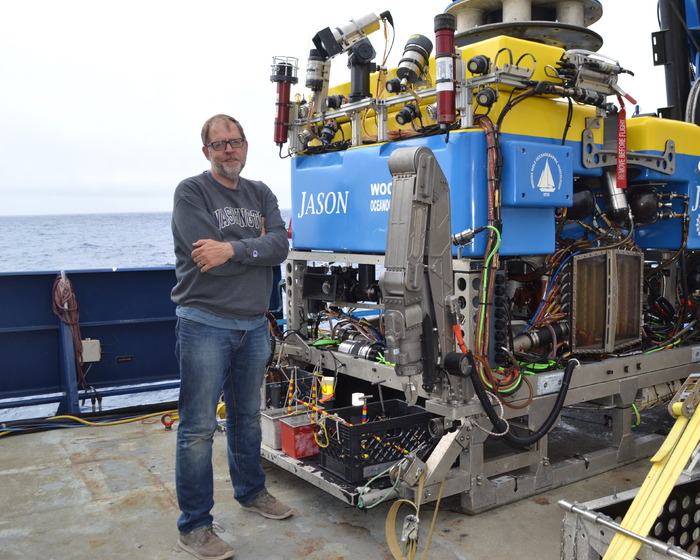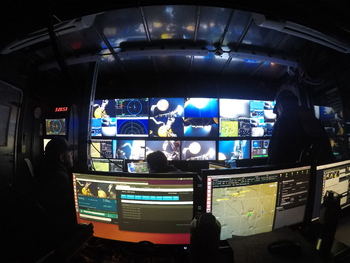Guest log by Rob Fatland, University of Washington, eScience Institute.
Imagine you sign up for a research cruise, your first... what should you expect? I was 53 when I got this opportunity; more likely you will be in your late teens or early twenties. Because why? Because don't oceanographers love to get college and high school students out onto the high seas as quick as possible. They wish for ocean research to continue... and so they try to hook students on the ocean as an adventure at the soonest opportunity. And in this spirit of 'come along and join the adventure' I was invited to ship out for two weeks of research work on the R/V Roger Revelle.
Now a person going backpacking in the Sierra Nevada mountains for the first time can't stop thinking about one thing: Bears. Are there Bears around? Will I see a Bear? Will the Bear attack me? Their more experienced friends are enjoying the stars and creeks and the wind in the trees, while patiently answering the Bear questions. On a research cruise you substitute Big Waves and Seasickness for Bears; Yes there are Big Waves about; and maybe you will see some; but most avoid seasickness with some care and even if you are affected you will quickly recover; and you will be just fine.
But this oversimplifies a bit. I boat in the sheltered inlets of Puget Sound where it is considered rough weather if you see white caps atop two foot waves. The ride will be a little bumpy particularly against the wind; and going sideways to the wind the boat rolls. On the Revelle -- upon leaving the sheltered Newport Oregon harbor for the open Pacific -- we found some very dramatic waves indeed. White caps yes but not even worth mentioning because a few moments after passing the breakwater the ship was rising and plunging on an endless parade of Pacific rollers, sharply peaked waves 15 feet high spaced thirty or so yards apart shifting about in a confused mass. This was definitely 'Seeing Bears' even if they were the smaller sort. A strong north wind blew pretty hard sideways across our westward path under a clear evening sky with a fetch of a hundred miles with which to pile up these shambling hills of water that barely noticed the 288 foot long hull of the Revelle.
I had no prior experience as to whether this was 'normal' or 'brisk' or 'concerning' as I stood on the forward deck watching the bow climb up and then drop every ten seconds or so. That slow motion is troubling to a land-based person like me: Each wave comes on slowly enough to give plenty of time to imagine bad things happening; and soon as it passes the next one arrives. I did notice that the other people seemed calm enough... so there I stood, my brain trying to sensibly connect the arriving shape of the next wave with the ponderous motions of the deck. I considered raising my level of concern from 'attending' to 'worrying'. I edged towards becoming seasick, dubious about going below, puzzled as to how tons of research equipment would be safely moved about so as to take the ocean's pulse in coming days. It was a sort of extended 'uh oh' feeling, somewhat at a loss, somewhat at sea. Both my hands latched on to whatever rails were nearby and I could take only a couple steps before clenching on to the next heavy piece of metal. I was advised to keep my knees bent and my center of mass low and it was good to have that to focus on. I needed a strategy beyond 'keep breathing and keep wearing the life vest'.
It was at this point that the captain emerged on deck. Wearing shorts. And a nice t-shirt. And he proceeded to stride calmly about the decks the way a person living in Arizona might stroll about their back garden. He seemed focused on ensuring that the gear distributed across the ship was secure. In view of such complete nonchalance it was obviously ridiculous to worry so I gave that up; and after a few more minutes on deck (I found a spot where a vent blew warm air) I went below, climbed into my berth, wedged myself against the bulkhead and went to sleep.
The chief scientist speaking to the students aboard the Revelle the following day happened to mention that research often begins by questioning assumptions, particularly assumptions that are deeply held and difficult even to see. I agree with this and found myself reflecting on an absurd example: Having paced across thousands of parking lots in my life I never thought twice about how solid and steady they are. Yet here on the steel deck of the Revelle--the size of a small parking lot--the idea of 'solid' certainly holds but there is no such thing as 'steady'. Steady doesn't exist; my idea of parking lots was all wrong. So was my idea that a solid object has a fixed weight. The weight of a door or a steel bar will change moment to moment on the Revelle. So alright, our assumptions challenged; that must be a good thing and after a day or so we had adapted, rolling up and down stairs and across decks carrying cups of coffee with grins on our faces (but with one eye on the nearest railing just in case). Now past the Bears it is our good fortune to discover next why the oceanographers really brought us here.



